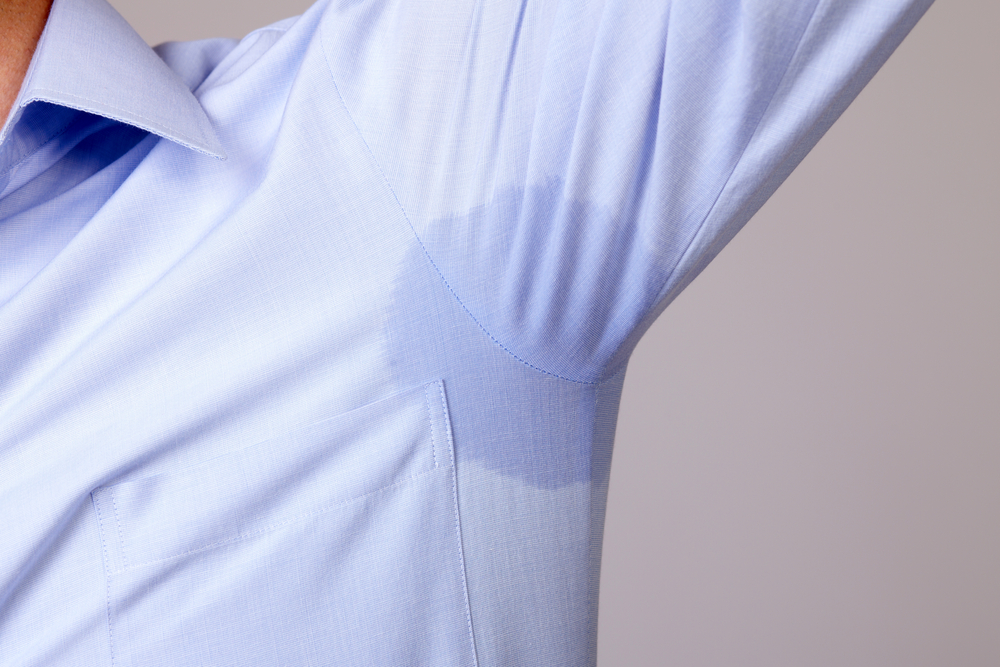Worcester Dermatology Associates in Worcester, MA routinely treats cases of hyperhidrosis, better known to the public as excessive sweating. The regular production of too much sweat affects approximately 3% of the population and may be noticeable in the underarms or on the face, palms, feet, hairline, or scalp. There are many treatment options and lifestyle adjustments that can help curb or even eliminate excessive sweating. Learn more about your range of prevention and treatment options now.
Steps You Can Take to Avoid Excessive Sweating
Communicate Clearly With Your Doctor About Your Condition
Hyperhidrosis may occur on its own or as the result of an underlying condition. For this reason, communicate all of your known medical conditions to us when you come for a consultation. Our clinicians can help distinguish the best treatments for you in part by determining whether your excessive sweating is its own primary issue or secondary to another medical condition. An overactive thyroid, for example, can cause symptoms of hyperhidrosis. Finally, you want your doctors to know which medications you are taking, as sweating can sometimes be a side effect.
Use Topical Antiperspirants and Creams
Topical antiperspirants are typically used daily and may be used both preventatively and to address existing hyperhidrosis, and you are likely already using these. These products are available over the counter in a variety of scents, though most use aluminum salts as an active ingredient. You may need to try several brands of over-the-counter options. Some people may need to apply antiperspirant both morning and night for optimal results.
See Us About miraDry
For patients who are seeking a more aggressive or final treatment than topical antiperspirants for hyperhidrosis, miraDry can be life-changing. One key benefit of miraDry is that patients experience immediate and permanent results. The treatment is non-invasive and non-surgical and typically only takes one hour in our comfortable, clean office.
How It Works
miraDry treatment is straightforward and simple. The treatment system directs thermal energy to the sweat glands in the underarm where sweat and its associated odor are produced. This energy targets these sweat and odor glands, ultimately eliminating them entirely. These glands do not grow back, meaning patients only need one course of treatment to enjoy complete relief from excessive sweating and the anxiety and social discomfort that comes with it.
When you receive a miraDry treatment, we will first administer a numbing agent to the underarm area. Most patients experience a sensation of light suction during the treatment as the device draws the glands closer to the surface of the skin. Then, thermal energy from the device eliminates the glands, giving you a lifetime of relief from hyperhidrosis.
Get Botulinum Toxin Injections (Botox)
Popularly known as Botox, these injections have been shown to provide impressive temporary results. The injections may be applied to a variety of areas, including underarms, hands, and feet. Botulinum toxin works by blocking the chemical that triggers the body’s sweat glands into activating, specifically by blocking the nerve signals that stimulate these glands. The injections are a quick, in-office treatment.
Results of Botox treatment generally last approximately 6 or 7 months. Most patients are likely to require several rounds of injections during the course of a full treatment, typically repeating the injections every 6 months or at least yearly to maintain their results.
Practice Anxiety Control and Stress Reduction
In many cases, hyperhidrosis is directly linked to stress or anxiety. For this reason, treating these symptoms, whether they are underlying conditions or negative emotional responses to hyperhidrosis, can be a crucial part of maintaining the patient’s mental well-being and physiological reactions. Typically, behavioral therapies are used in conjunction with more traditional medical interventions as part of a comprehensive, multi-disciplinary approach to treatment.
Many of the ways you can control stress and anxiety can be achieved at home. Breathing exercises, for instance, have been clinically shown to help reduce anxiety. Meditation and mindfulness practices, including mindfulness-based stress reduction, can also help prevent negative emotions from aggravating your physical condition. These simple practices easily combine with other interventions, and patients can safely practice them on top of clinical dermatology treatments.
Consider Your Foods and Lifestyle
Certain foods are known to trigger sweating, and avoiding them altogether can help you curb symptoms of hyperhidrosis and avoid worsening the condition. Some of the foods you may want to consider eliminating from your diet or restricting your intake of include:
- Spicy foods and hot sauces
- Coffee and other drinks containing caffeine
- Monosodium Glutamate (MSG)
- Alcoholic beverages
On the other hand, ingesting these foods may help to naturally reduce sweating:
- Water
- Fruits and vegetables with high water content
- Oats
- Olive oil
- Magnesium-rich foods, such as almonds, pumpkins, soy products, and spinach
- Calcium-rich foods, such as yogurt, cheese, and other dairy products
- Whey
Lifestyle Changes
You may also want to examine other lifestyle areas. Simple changes such as wearing breathable or loose-fitting clothing, for instance, may help you manage symptoms. If your feet are the affected area, being barefoot at home, wearing thinner socks, and wearing sandals may make a substantial difference.
Your cosmetics and beauty products can also worsen or improve sweating. For example, moisturizers that contain oil (such as those marked for “dry skin”) can cause sweat and sebum production, which leads to acne. Look into oil-free alternatives. Individuals with hyperhidrosis who wear makeup may also look into sweat-proof options from a variety of brands.
Consult With a Professional About Eliminating Hyperhidrosis
If you are concerned about excessive sweating or don’t know what your best options are, contact Worcester Dermatology Associates in Worcester, MA today. Our experts can evaluate your condition and help create a treatment plan for your unique situation and needs.

